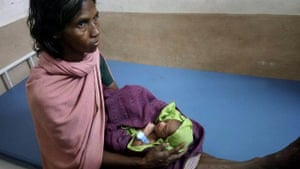At the upmarket Cloudnine hospital in Gurgaon, the latest accessory among parents is a temperature-taking bracelet for newborns.
The bracelets, made by Bangalore-based startup Bempu, constantly monitor a baby’s temperature and sound an alert if it goes too high or too low. Doctors use the bracelets while babies are in neonatal intensive care or prescribe them for babies being discharged.
“New mothers are very worried about whether their babies are too warm or too cold,” says Dr Sanjay Wazir, director of the neonatal intensive care unit at the hospital. “[The bracelets] are better than a thermometer because they are continuously monitoring the baby’s temperature.”
In India, 8 million prematurely-born underweight babies every year are at high risk of developing hypothermia, where body temperatures fall below 36.5C, which contributes to fatal conditions such as asphyxia, sepsis and pneumonia. India has the highest number of infant deaths caused by premature birth, most of which could be prevented. Maintaining a newborn’s body temperature is critical to its survival.

Bempu is currently running a pilot scheme in the desert state of Rajasthan, funded by health foundation WISH, which aims to make its bracelets a staple free handout for all babies discharged early from government hospitals.
The chaos of government hospitals can lead to oversights when monitoring newborns’ temperatures, says Gini Morgan, head of public health at Bempu, which has benefitted from grants from the Bill and Melinda Gates Foundation, USAid, UK Aid and other agencies.
“The beds are always filled, the entire family is in the waiting room every day, there are often three babies in one incubator, where there should be only one. There’s a lack of staff, the nurses are overworked, running around with competing priorities. In all that, its hard to manage all these high-risk babies.”
Many hospitals discharge babies early to free up cots, or because parents need to return to remote villages and cannot afford to wait for long periods at the hospital. “Parents travel to district hospitals and they need to get back home,” Morgan explains. “Every day that they’re away from work, they’re missing a pay check.”
Once home, parents are less likely to notice symptoms of hypothermia or have adequate information about how to keep babies warm. Half the world’s newborn babies die at home, almost all of those who die are in developing countries. Hypothermia is one of the leading contributors to these deaths. Fortunately Bempu bracelets are powered by a battery that runs for a month, the critical period for newborns.

“It’s not the same as using a thermometer because the device is constantly monitoring the baby’s temperature. Say you take the baby’s temperature now, it can fall after 30 minutes, and you may not notice,” says Dr Wazir, who hopes a crowdfunding campaign will help supply Bempu bracelets to underprivileged mothers at his Premature Babies Foundation, ahead of the winter months, when the risk of hypothermia rises.
But the bracelets alone are not enough, says Dr Vishnu Bhat from the Jawaharlal Institute of Postgraduate Medical Education and Research in Pondicherry, who conducted an independent study of their accuracy, the results of which are yet to be published. “We found that the nurses were taking temperatures more accurately than the Bempu bracelets. But the bracelets were good, we found they gave an accurate temperature reading between 85-90% of the time,” he said.
“The bracelets would be useful to mothers who live far from the hospital, the alarm system provides a warning to the mother that the baby is unwell. It would also be good in postnatal wards where nurses are in short supply. But of course, the temperature is not the only issue, mothers need to be trained, they need to be told what to do if the temperature is too low or too high,” he said.
Baby bracelet aims to save newborns in India from hypothermia
Hiç yorum yok:
Yorum Gönder